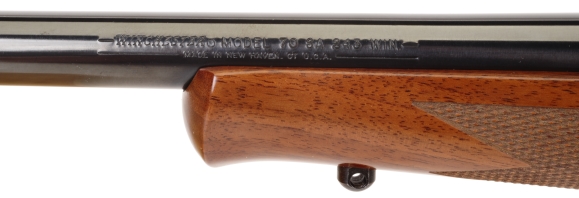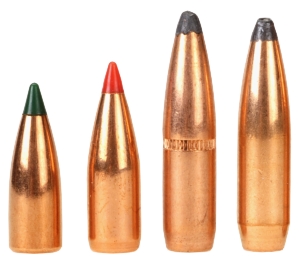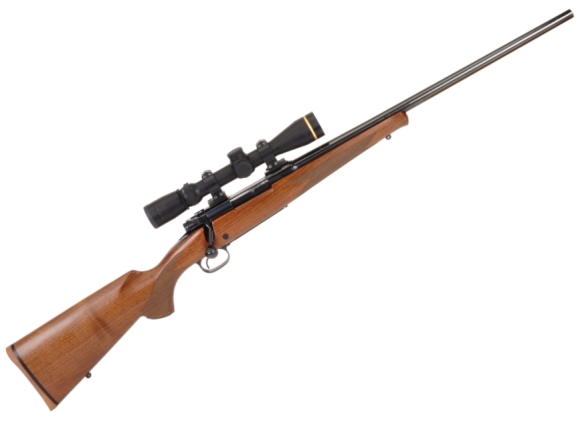August 1, 2021

One, or more, should not trifle with bullet selection. The four nominees for this project are certified trifled free.They were on the shelf, they work within their respective applications and… they were on the shelf.
Where once “proven and reliable” sold, now “New! New! and New!” and “Better! Better! Better!” are the consumer’s calls to action. Each year brings a new crop of bullets that supposedly fly straighter, kill cleaner and do unimaginable things at longer distances.
As I have never had any quality, conventional lead core jacketed hunting bullet fail, I have no greater expectations to be met. Subsequently, my view is that each new year’s bullet design is most successful at increasing the price of bullets and quelling masculine insecurities within a hunter’s peer group. Yes, quelling is the word I chose and I am sticking with it. OK, maybe suppressing would work. I don’t know.
Varmint hunting is not on my to do list for the 243 Winchester. However, reserving for the remote possibility that everyone does not think like me… whew!, a couple of good varmint bullets made the group. How do I know they are good? At a couple of hundred yards, after exiting from this short barrel Winchester, they turn small ground hole producing fury mammals into so much wide spread brush fertilizer.
The two heavier weight bullets are solid performers on deer, hogs and anything similar. Both are conventional lead core and are very effective out to three hundred yards on deer. No, not just on small deer.
Flat based bullets typically conserve case net capacity and, in my personal experience, they are as accurate as a boat tail design at the referenced distances. So why were boat tail bullets selected? Because they were on the shelf and because they perform as well as flat based bullets within this context.
Yes, there is a great deal of theory as to why boat tail bullets are ideal for longer range, virtually none of which is supportable. Race cars have not had boat tails since the early 1960’s, Bonneville land speed record cars to not have boat tails, jets don’t have boat tails, rockets don’t have boat tails, rain drops do not have boat tails.
Maybe boat tails shift bullet center of pressure to reduced bullet pitch and yaw and keep the bullet tracking along its path? Or maybe, like the mullet, they shift mass from the front and park the excess in the back? I don’t know. I do know that they have a longer, tapered ogive for an improved ballistic coefficient and they are effective on game, properly loaded they are very accurate and many are cost effective.

Above, left to right: Sierra BlitzKing 55 Grain #1502, Hornady V-Max 65 Grain #22415, Hornady BTSP 100 Grain #2453, Speer BTSP 100 Grain #1220.
Warning: Bullet selections are specific, and loads are not valid with substitutions of different bullets of the same weight. Variations in bullet length will alter net case capacity, pressure and velocity. Primer selection is specific and primer types are not interchangeable. These are maximum loads in my firearms and may be excessive in others. All loads should be reduced by 5% as a starting point for development where cartridges have greater than 40 grains in capacity and 10% for cartridges with less than 40 grain capacity following safe handloading practices as represented in established mainstream reloading manuals. Presentation of these loads does not constitute a solicitation for their use, nor a recommendation.

| Cartridge – 243 Winchester |
|
| Firearm | Winchester Model 70 |
| Barrel Length | 20.00″ |
| Min – Max Case Length | 2.045″ +0.000″/-0.020″ |
| Min – Max COL | 2.450″ – 2.710″ |
| Primer | CCI 200 |
| Bullet Diameter | 0.2430″ +0.000″/-0.0030″ |
| Reloading Dies | Redding FL |
| Bullet Type | Bullet Weigh Grains |
Net H2O Grains Capacity |
C.O.L.” | Powder Type |
Powder Charge Grains |
Muzzle Velocity FPS |
Muzzle Energy Ft-Lbs |
3 Shot Group 100 Yd “ |
| Sierra BlitzKing | 55 | 52.3 | 2.650 | RL 15 | 46.0 | 3608 | 1590 | 0.7 |
| Sierra BlitzKing | 55 | 52.3 | 2.650 | Varget | 45.5 | 3540 | 1530 | 0.4 |
| Sierra BlitzKing | 55 | 52.3 | 2.650 | BL-C(2) | 47.5 | 3589 | 1573 | 0.7 |
| Hornady V-Max | 65 | 50.8 | 2.600 | H414 | 48.0 | 3436 | 1704 | 1.0 |
| Hornady V-Max | 65 | 50.8 | 2.600 | H380 | 45.0 | 3351 | 1620 | 0.6 |
| Hornady V-Max | 65 | 50.8 | 2.600 | Win 760 | 48.0 | 3398 | 1666 | 1.1 |
| Hornady BTSP | 100 | 48.7 | 2.630 | RL 17 | 42.5 | 2925 | 1899 | 0.3 |
| Hornady BTSP | 100 | 48.7 | 2.630 | RL 22 | 46.0 | 2931 | 1908 | 0.8 |
| Hornady BTSP | 100 | 48.7 | 2.630 | IMR 7828 | 46.0 | 2901 | 1869 | 0.7 |
| Speer BTSP | 100 | 48.8 | 2.625 | RL 17 | 43.0 | 2961 | 1946 | 0.6 |
| Speer BTSP | 100 | 48.8 | 2.625 | RL 22 | 46.5 | 2928 | 1903 | 0.8 |
| Speer BTSP | 100 | 48.8 | 2.625 | Norma MRP | 46.5 | 2916 | 1888 | 0.5 |
Concluding remarks…
If it were me, there would be none as there is nothing I could say that could not be found in the front end of a reloading manual. Clean your brass, inspect it carefully, trim it to size, tidy your room. The 243 Winchester is an easy to reload cartridge that does not stray beyond the norms and good practices of reloading.
Use of the handload data above resulted in no bullet to rifling interference, no blown primers and no song of excess pressure in report. There were also no split cases, neck or casehead and no hard chambering or extractions.
The results only affirm what was already known. Great woodland deer rifle and the 243 Winchester has plenty of steam and flat trajectory to make this a this a handy, lightweight hunting rifle with near 300 yard point blank range. What does that look like?
| Best Zero Results for Speer 100 Grain |
|||||||
| Near-Zero – yds. | 26 | Mid Range – yds. | 140 | ||||
| Far-Zero – yds. | 247 | Max Ordinate – in. | +3.0 | ||||
| Point Blank – yds. | 263 | ||||||
| Best Zero : Range 0 – 400 yards | ||||||||||||
| Yards | 0 | 50 | 100 | 150 | 200 | 250 | 300 | 350 | 400 | |||
| Velocity – fps | 2961 | 2851 | 2743 | 2638 | 2535 | 2434 | 2336 | 2241 | 2148 | |||
| Energy – ft.-lbs. | 1946 | 1804 | 1670 | 1545 | 1426 | 1316 | 1212 | 1115 | 1024 | |||
| Momentum – lbs-sec | 42 | 41 | 39 | 38 | 36 | 35 | 33 | 32 | 31 | |||
| Path – in. | -1.50 | 1.09 | 2.61 | 2.97 | 2.09 | -0.15 | -3.86 | -9.16 | -16.19 | |||
| Drift – in. | 0.00 | 0.00 | 0.00 | 0.00 | 0.00 | 0.00 | 0.00 | 0.00 | 0.00 | |||
| Time Of Flight – sec. | 0.00 | 0.05 | 0.11 | 0.16 | 0.22 | 0.28 | 0.34 | 0.41 | 0.48 | |||

I know that new firearms are a lot of fun. However, new products rarely are better. In order to keep costs down in the face of inflation, or in the quest for increased profitability, parts become plastic and MIM, walnut yields to polymer and hand fitting has gone the way of a Republican Congress. The feel of substantial, has been replaced with the feel of technology.
What new firearms do offer is incredible accuracy at a lower cost. However, for most hunters and recreational target shooters, the difference between 1.2 MOA and 0.5 MOA is meaningless and the advantage is often beyond the reach of a majority of the shooters.
These.. mature firearms are readily available on-line, if not at the local gun store. For the astute shopper, they also are available at prices well below the budget priced firearms being manufactured today. Good gun, good cartridge, excellent combination.

Email Notification